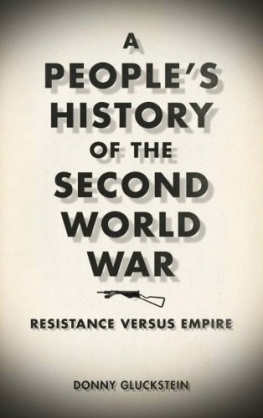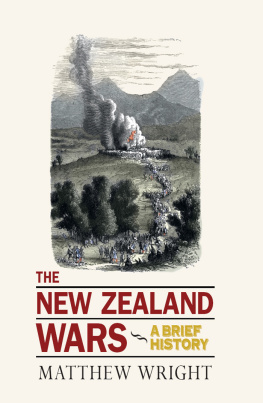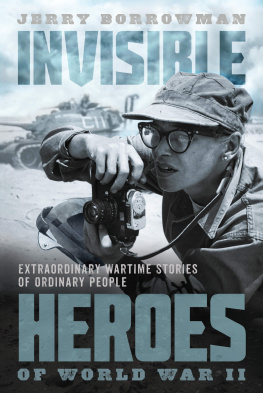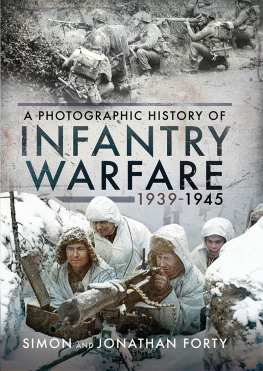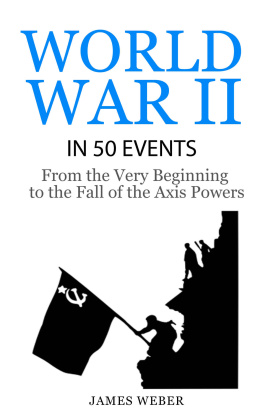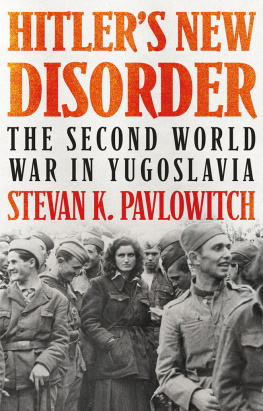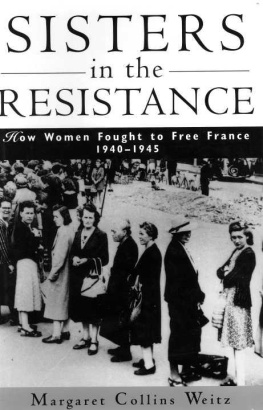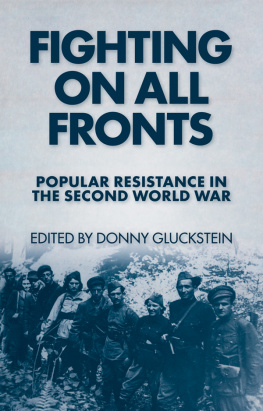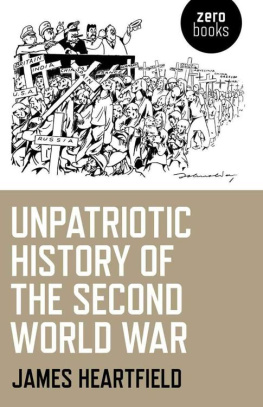A PEOPLES HISTORY OF THE SECOND WORLD WAR
Resistance versus Empire
Donny Gluckstein
Acknowledgements
I am indebted to many people who helped so generously with this book. Special thanks are due to Nick Howard, Neil Davidson, Manfred Ecker, Owen Gower, Gordon Davie, Gajendra Singh, Nelly and David Bouttier, and Charlotte Bence.
viii
Preface
There is an official version of the Second World War that is relatively easy to unearth. Alongside the paper record, the Allied establishment happily proclaims its triumph in public monuments like the Cenotaph in London. Public parades, films, books and TV series like Band of Brothers, also testify to Allied victory. Others are calmer. Westerplatte, where the Second World War began outside Gdansk, Poland has a sombre atmosphere, as does the ruined Kaiser Wilhelm church, which still bears witness to the power of aerial bombardment in the centre of Berlin.
By contrast, the other war, the peoples war, is largely hidden. So unearthing it proved a challenge in time and space. It took as long as the Second World War itself to write this book and involved travel to the countries listed in the contents (as well as several excluded due to limitations of space). Sometimes concealment is deliberate, such as the resistance radio transmitter secreted in the roof of a warehouse in Bergen, Norway. Sometimes the motivation is more pernicious. At the Military Museum, Athens, there is absolutely no mention of the resistance movement that liberated Greece, because its politics was too radical.
When it fits the official narrative there are resistance museums, ranging from the spectacular Warsaw Uprising Museum, the futuristic Slovak National Uprising Museum in Banska Bystrica, to the Danish Resistance Museum in Copenhagen and the Vredeburg Museums diorama in Yogyakarta, Indonesia. Most resistance museums are tiny, however, sometimes in one or two rooms in obscure towns and villages. More often simple plaques tell the story from the one dedicated to the Indian National Army in a quiet park in Singapore, to the bustling main square in Bologna. Other evidence can range from cemeteries, to the direct memory of participants, or even workshops for the disabled descendants of those genetically damaged by Agent Orange during the long Vietnamese war. Anywhere that fighting occurred, and that is almost everywhere, there is something to be found if it is looked for.
The difference between the two wars the imperialist war and the peoples war is well symbolised in my home town, Edinburgh. Towering above the streets on the Castle Rock stands Scotlands
ix
x A PEOPLES HISTORY OF THE SECOND WORLD WAR
National War Memorial. Hundreds of metres below, down a dark staircase, in a corner under a tree near the railway line, is a metal plate, hardly larger in size than this book. It is dedicated to those who died fighting fascism in the Spanish Civil War. Hopefully this work will put both aspects into a more balanced perspective.
Introduction
THE IMAGE OF THE SECOND WORLD WAR A PARADOX
The Second World War is unique among twentieth-century conflicts. Other wars, such as the First World War, Vietnam, Iraq, or Afghanistan, began with public support whipped up by a supine media, but lost it once the deadly reality and the true motivations of governments broke through the propaganda smokescreen. The Second World War escapes this paradigm. Its reputation was positive from start to finish and it remains untarnished even now.
There was understandable joy at the defeat of the Germany, Italy and Japan in countries under the Axis heel. But pollsters in the United States found that the wars popularity only increased as the death toll mounted. While approval for President Roosevelt never fell below 70 per cent, support for peace initiatives declined.
A similar situation prevailed in Britain, where Mass Observation volunteers measured public opinion. They assiduously recorded overheard conversations, and gauged attitudes. A typical remark of the early phoney war period (when hostilities had been declared but virtually no military action taken) was: I cannot see why we are not doing something ... Why dont we go and attack Italy, or start something in Abyssinia. One Observer noted the overwhelming acclamation with which the news of any offensive action is received. Todays imperialists do not shake cans in the streets to finance their bombing operations, but in 1940 a Fighter Plane Fund was established whose most striking feature was the way in which everyone joined in the collection .... Years of gruelling struggle and enormous loss of life did not dim enthusiasm. News of the D-Day Normandy landings in 1944 evoked wild rejoicing:
The child excitedly exclaimed Daddy the second fronts started. Daddy rushed downstairs; fumbles with the wireless knob and asks; Did we invade? No jokes. Youre kidding. The family sits down to breakfast but are much too excited to eat. We had an urge to rush all over the place, to go knocking at neighbours doors to find out whether the invasion has started.
A PEOPLES HISTORY OF THE SECOND WORLD WAR
Till the end Mass Observation surveys failed to detect war weariness. Thousands of miles away Dmitriy Loza, a Red Army officer,
eulogised the fight against Nazism as a Sacred War:
[W]ar came to us on 22 June 1941, bringing with it blood and tears, concentration camps, the destruction of our cities and villages, and thousands upon tens and hundreds of thousands of deaths ... If it would have been possible to collect all the tears ... that flowed during the four years of the war and to pour them out on Germany, that country would have been at the bottom of a deep sea....
Even with 70 years distance, fascination with the Second World War endures. As Loza predicted ten or even a hundred generations of true patriots will not forget this war. No other military event has spawned so many works of history, fiction, or drama. Nearly half of all war films made deal with the Second World War. The shares taken by the First World War, Vietnam and Korea are 12 per cent, 2 per cent and 2 per cent respectively. The rest from Ancient Rome to science fiction make up the remaining third.
The Second World Wars popularity is surprising given its enormous destructiveness. In comparing casualty figures the warning of this Japanese commentator should be remembered: We shouldnt make deaths into numbers. They were each individuals. They had names, faces ... My brother might just be a fraction of several millions, but for me hes the only Elder Brother in the world. For my mother he was the only Eldest Son. Compile the dead one by one.
Nevertheless the statistics are staggering. The 191418 war generated up to 21 million deaths. The tally for 20 years of fighting in Vietnam was five million, while in three years the US-led war on Iraq cost 655,000 lives. Although firm figures for 193945 are lacking, one source suggests 50 million people died, of which 28 million were civilians. Chinese losses alone matched figures for Germany, Britain and France in the First World War combined.
Why did such carnage not dent the Second World Wars reputation? The answer lies in the widely held and enduring belief that it was a good war, when righteousness triumphed over injustice, democracy over dictatorship, tolerance over racism, and freedom over fascism. Terkels oral history of America captures this spirit:
It was not like your other wars, a radio disk jockey reflected aloud ... It was not, most of us, profoundly believed, imperialistic.
Our enemy was, patently, obscene: the Holocaust maker. It was one war that many who would have resisted your other wars supported enthusiastically. It was a just war, if there is any such animal.
On the Eastern front, Loza concurred: The people put up a wall against suppressors, aggressors, thieves, torturers, debauchers, and fascist scum, the dregs of humanity. They threw all their antipathy into the face of this detested, hated enemy!
Next page
